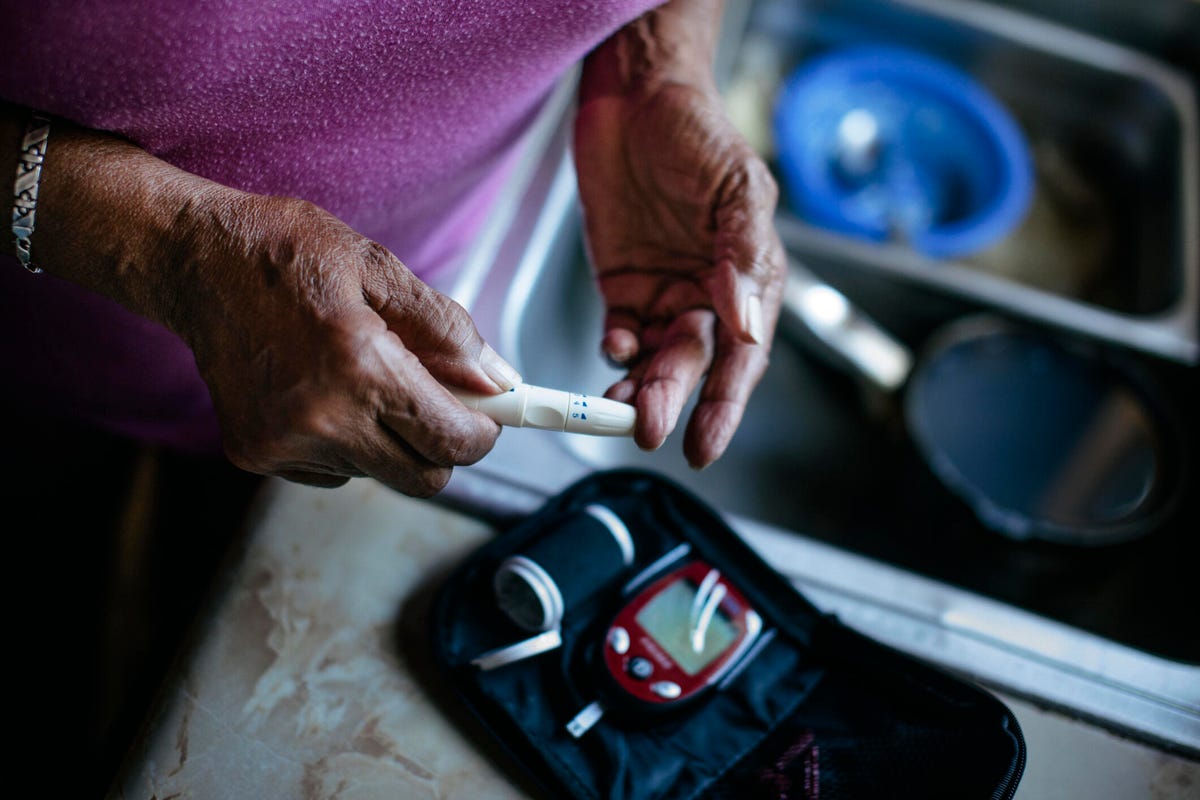A heat wave has stifled parts of the US this week, with people across the Midwest and Northeast enduring high temperatures as summer has only just officially begun.
While there are key things everyone can do to protect themselves during a heat wave, like keeping cool and staying hydrated at all times, heat doesn’t impact all people equally. Very common health conditions like high blood pressure and diabetes, and even medications used to treat them, can exacerbate the effect of heat on someone’s body. A drug as common as an allergy or heart health medication can make the heat harder to withstand.
Here’s what to know about underlying health conditions and how you can take extra care and stay prepared if you have one. As always, you should call 911 if you’re in distress or are having a hard time breathing. Also, it’s helpful to know the symptoms of heatstroke or whether it’s heat exhaustion, which typically occurs before heatstroke begins, whether it be for your health or a neighbor’s.
Read more: Wild Weather Ahead: Summer 2024 Could Be a Scorcher After Hottest Year on Record
Respiratory conditions
People with health conditions that affect the lungs or airway, like asthma or chronic obstructive pulmonary disease, are more affected by the heat, as hot weather may constrict the airways. If you have a respiratory condition, pay attention to air quality alerts in your area and try to limit your time outside on the hottest days.
What to do: If you have asthma or use an inhaler, you may want to carry your inhaler with you at all times, according to Penn Medicine, and check in with your doctor if you notice your symptoms worsening. Make note of the inhaler’s instructions for storage, and definitely don’t leave it in your hot car or anywhere it can overheat.
As laid out by Temple Health, you may also want to plan your day around the hottest periods. For example, if you need to run errands, try going out in the morning or later in the evening.

Very common health conditions, like diabetes and high blood pressure, can make a person more susceptible to soaring temperatures.
Skin conditions
Weather at both ends of the spectrum can cause symptoms to flare up for people with eczema and rosacea. High heat is associated with dehydration, sweating and more sunlight — all of which can trigger a flare-up of a skin condition. Also, people prone to acne may notice more breakouts in the summer, thanks to all that sweat and the bacteria that’s in it.
What to do: If you have eczema, follow these tips for the summer months from the American Academy of Dermatology Association:
- To keep skin hydrated (and reduce the likelihood of a flare-up): limit showers to one per day, in lukewarm water, and try to keep to under 10 minutes. If you do sweat or require another shower, try to make it a cool one.
- Use fragrance-free soaps, shampoos and even laundry detergent, if you can. The sweat can make someone sensitive to fragrance or dyes even more sensitive. (Plus, don’t overdo it on soap in general.)
- Wear loose clothing.
If you’re prone to acne, take extra care to shower or rinse off after exercise or sweating in the heat, as the bacteria and sweat buildup can make everyone more susceptible to pimples.
If you have a skin condition, pay extra close attention to the ingredients in your sunscreen. The National Eczema Association recommends mineral-based ingredients.
Read more: How to Know If Someone Is Having Heatstroke
Diabetes
About 11% of people in the US have diabetes, and people with both Type 1 and Type 2 diabetes feel the heat more than others, according to the US Centers for Disease Control and Prevention.
Diabetes can cause complications that interfere with how your sweat glands work, and therefore how well your body is able to cool itself. Diabetes can also dehydrate you (dehydration is a very common symptom of diabetes, and not one to overlook), worsening an already-common issue during the summer months. Additionally, high temperatures can change how your body uses insulin, according to the CDC.
What to do: Avoid getting sunburned as much as you can, as sunburn can raise your blood sugar, per the CDC. To do this, wear sunscreen, a big hat and even some protective, loose-fitting clothing, if you can. The CDC also recommends not going barefoot, even on the beach. (Some people with diabetes have nerve damage that affects their feet, making it hard to feel sensations like heat or pain in their feet.)
To keep yourself hydrated, try to limit alcohol or caffeine on really hot days. If you use insulin, make sure to store it as directed and away from extreme temperatures (PDF), as that can cause it to lose effectiveness.
Read more: Hack Your Hydration by Eating These 6 Expert-Approved Foods
Heart disease and high blood pressure
Being hot can put extra strain on your heart (PDF), which can be an issue if you’re living with cardiovascular disease. Also, people with high blood pressure are more likely to have heat-related illnesses or experience heatstroke. What’s more, some common medications people take for their heart or blood pressure can affect the body’s response to heat, including beta blockers, diuretics and ACE inhibitors.
What to do: Try to limit things that excite your body or raise your blood pressure, like drinking caffeine or doing anything strenuous when it’s hot outside, according to the Mississippi State Department of Health. As always, stay hydrated. And because such common medications for heart health can affect the way the body handles heat, it’s a good idea to check in with your doctor about how to most safely manage the warmer months.
You may also take advantage of the fruits of summertime, like fresh garden vegetables, to add to your nutrition and create a more heart-healthy diet.
Use these hot months as an excuse to get your blood pressure checked or managed. High blood pressure is extremely common; about half of US adults have it.
Read more: 10 Tips for Staying Cool This Summer While Sleeping Without an AC
Pregnancy
High heat, as well as pollution, can affect a pregnancy and increase the risk of early delivery, low birth weight and other not-ideal outcomes. This is in addition to making a pregnancy way less comfortable.
What to do: If you’re pregnant, take the steps you normally would to keep yourself and your internal body temperature cool, like staying indoors as much as possible on hot days and making sure you stay hydrated. To keep your nutrition intake up in the heat, try eating small, cool meals (like bowls of fruit or hearty salads), as BabyCenter suggests.

Research has shown that environmental stressors, including high temperatures and heat, affect a pregnancy and a developing fetus.
Autoimmune diseases
Health conditions that start in the immune system may flare up for people during the summer months. According to the Global Autoimmune Institute, high temperatures, UV light and humidity can trigger an immune response. Lupus, multiple sclerosis, rheumatoid arthritis and more may all be exacerbated by the heat, whether the effects are in the joints (as with arthritis) or neurological (as with MS).
What to do: The National Multiple Sclerosis Society recommends doing all the things you’re probably already doing to stay cool, like staying in an air-conditioned space (the society also notes that your AC cost may be tax deductible, if your health care provider writes a prescription for it to minimize symptoms). It also recommends doing some pre- and post-cooling if you’ll be exercising, by gradually adding cool water to tepid bath water. In general, as the Global Autoimmune Institute says, be mindful of sudden changes in temperature, which may also cause problems (i.e. going from a very cold air-conditioned room to a 90-something-degree sunny day). Allow your body time to ease into it.
If you have an autoimmune condition that affects the skin, like psoriasis, and warm weather makes it worse instead of better, you may help prevent a flare-up by following the skin care tips for people with eczema, like using gentle soaps and limiting warm showers.
Mental health symptoms
Extreme heat and climate change affect mental health in many, often overlapping, ways. For example, many mental health conditions are more likely to occur in people with other health conditions, or those who are affected by factors that make them more vulnerable to high heat, like poverty.
People with schizophrenia may have a harder time regulating their body temperature, and some medications prescribed for mental health, including certain antidepressants, medications to manage psychosis symptoms and stimulants for ADHD can also affect the way the body regulates temperature.
Many people may also be at a higher risk of depression, irritability or mania during the warmer months of spring and summer, and extreme heat has been linked to more reports of harm and death.
What to do: If you’re experiencing symptoms of depression, hopelessness or mania, or any type of mood state that affects your quality of life, talk with a medical or health-care professional about a plan to manage symptoms during warmer waves when symptoms could be worse, as well as a long-term plan for getting help.
If you’re taking prescription medication for anything (whether it be for mental health symptoms or something else) it’s a good idea to check in with your doctor about whether there are any additional steps you should take to stay safe.
If you are having thoughts of suicide, or you believe someone you know is in danger, you should call 911 (or your country’s local emergency line) or go to an emergency room. Explain that it’s a psychiatric emergency and ask for someone who is trained for these kinds of situations.




















+ There are no comments
Add yours